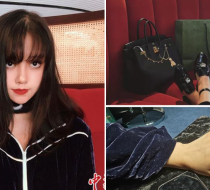Zou Yaqi, a Chinese woman who spent 21 days living in Beijing for free by taking advantage of inherent classism issues in China Favorite
BEIJING — Like many art students, Zou Yaqi often worried she’d be unable to afford to live in Beijing after graduation. So, earlier this year, she decided to set herself a daunting challenge: Survive in the city for three weeks without spending a single yuan.
It turned out to be a piece of cake.
The 23-year-old spent most of May living the high life: gorging on buffets in VIP lounges, sipping wine at exclusive events, and sleeping on plush sofas in the lobbies of five-star hotels. She ended up sticking to her zero-yuan budget with ease.
The secrets to her success? A fake Hermès handbag, bright red lipstick, and a velour designer tracksuit — all of which helped Zou pose as a member of China’s wealthy social elite. She found that when she was disguised as a mingyuan — or “socialite” — businesses would let her exploit their hospitality without question.
The experiment — which Zou documented and later turned into a performance art project — has since become one of China’s most talked-about artworks of 2021. But it has also thrust the artist into a heated — and, at times, ugly — debate about class and privilege, highlighting the deep rifts that have opened up in Chinese society.
China’s rising wealth inequality has become a hot-button issue in recent years. The top 20% of earners in Chinese cities now have five times more per capita disposable income than the bottom 20% on average, with the gap nearly doubling since 2000.
Public attention has focused on the wealth divide even more in 2021, as the Chinese government has made tackling the issue one of its top policy priorities. In the summer, authorities vowed to “adjust” excessively high incomes and force the rich to “give back to society.” So when Zou presented her project at Beijing’s Central Academy of Fine Arts in June, it quickly went viral on Chinese social media.
While Zou said her stunt was intended as a criticism of capitalism and consumerism, many critics have accused her of being unaware of her own privilege.
Zou coined a term to describe this phenomenon: “excessive goods.” An “excessive good” could be anything that is given to the wealthy for free, but is inaccessible to the non-wealthy. A complimentary snack at a swanky bar. A free gift at a luxury store. A bottle of wine at an invitation-only dinner.
To Zou, these “excessive goods” were a potent symbol of the wealth gap. They were seemingly everywhere, yet the capital’s high-rollers barely noticed them. Often, they ended up being thrown away.
“It’s very interesting how such free ‘excessive goods’ are distributed: They’re often given to people who seem to already have plenty,” Zou wrote on Weibo.
By passing herself off as a mingyuan, infiltrating Beijing’s posh hangouts and living entirely off the freebies they provided, Zou aimed to highlight how Chinese society had become increasingly divided under capitalism.
Luo Meihan
Six Tone







